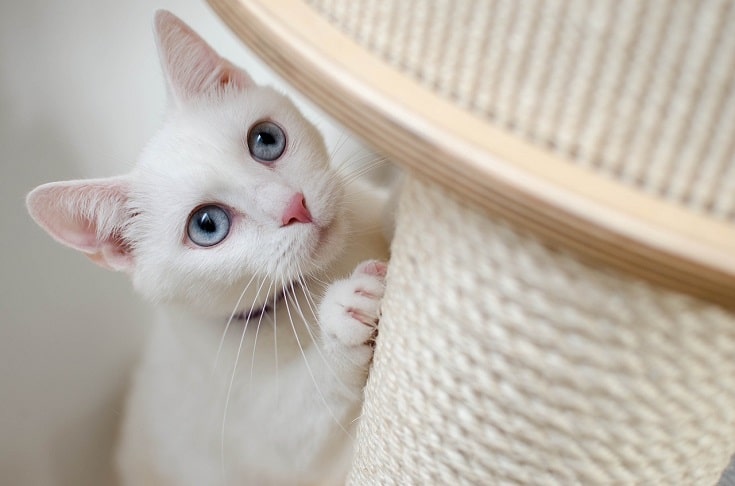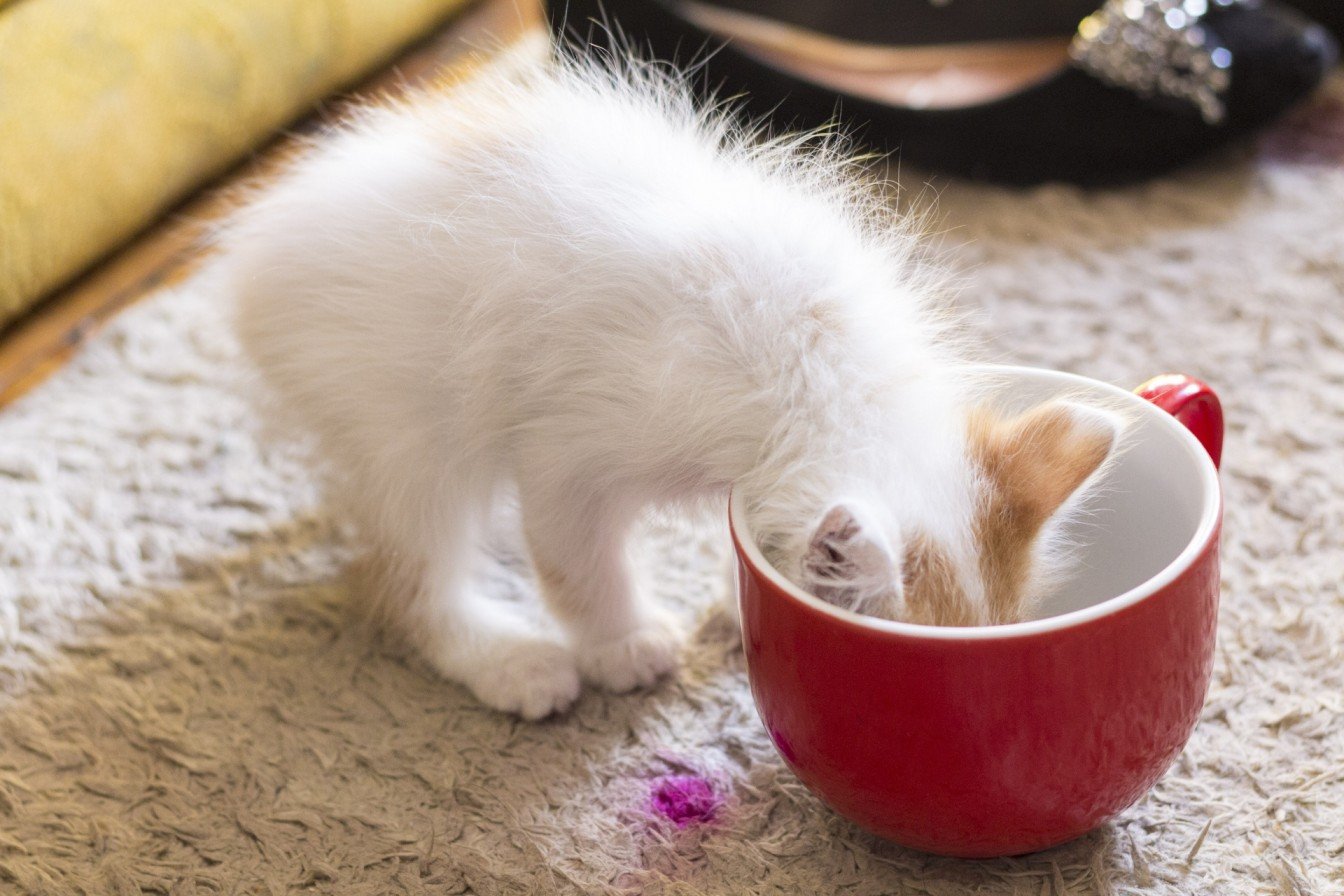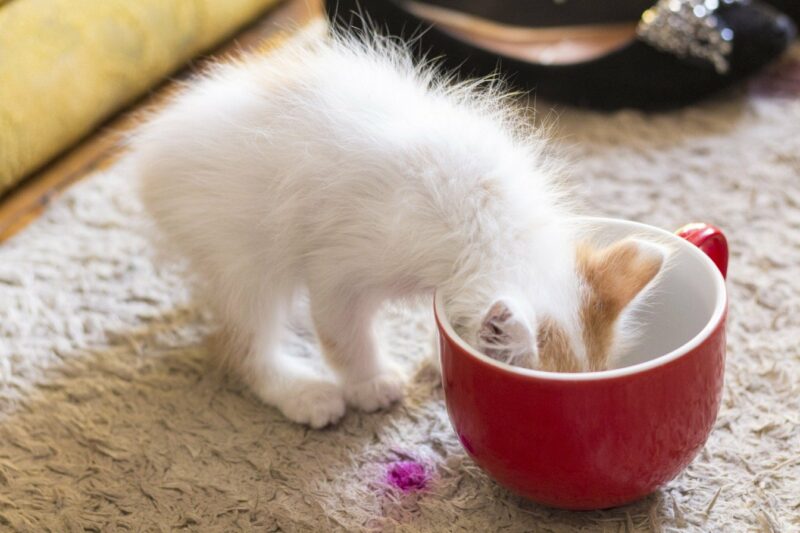There has been a huge movement away from cow’s milk in recent years toward other lactose-free options, including almond and soy milk. While many of us enjoy the lactose-free benefits of these milk replacements, is almond milk safe for cats?
The answer is technically yes, as almond milk is not toxic to cats. However, cats don’t benefit from almond milk, and it may give them digestive issues. If offered, it should be done in strict moderation. Almond milk is superior to cow’s milk and soymilk for cats because it is lactose-free (most cats are lactose intolerant).
Soymilk is made from soy, which is one of the possible food allergens in pets. With that in mind, it may seem like almond milk is a great treat to slip into your cat’s saucer every evening, but unfortunately, that’s not true. In this article, we’ll dive deeper into what exactly almond milk is, how it’s produced, its potential health benefits and downsides, and whether you should give it to your cat.
Before changing your cat’s diet or introducing new ingredients or supplements that they haven’t eaten before, especially when it comes to human food, make sure to consult your veterinarian first. Every cat is different and requires an individual approach to nutrition, depending on their age, health, level of activity, and medical history. The guidelines offered in our article have been fact-checked and approved by a veterinarian but should be used as a mere guide on food safety, rather than an individual nutrition plan.
Almond Milk 101
As you may have guessed, almond milk is produced from almonds and has a creamy texture and somewhat nutty flavor. It is lactose, saturated fat, and cholesterol-free and can come sweetened, unsweetened, and in various flavors.

The production of pure almond “milk” is relatively simple. The almonds are soaked in water, usually overnight, and then blended with more water in a high-power blender. The milk is separated from the pulp and ready to drink. In commercial production, however, sweeteners and flavors are often added, and the milk is often pasteurized for a longer shelf life.
There are sustainability issues when it comes to growing almonds, and one single glass of almond milk can require around 70 liters of water to produce. That is far more than other popular milk replacements, like soy and oat milk, but less than cow’s milk.
Are There Any Benefits of Giving Almond Milk to Cats?
In moderation, almond milk may be fine for your cat, but it doesn’t contain any potential health benefits they aren’t already getting from a healthy diet. Because most cats are lactose intolerant, almond milk can substitute for cow’s milk and is less likely to give them the associated stomach issues.
However, some cats will still develop digestive issues, and you should monitor them for 24 to 48 hours after they have had a sip of almond milk. Almond milk is also cholesterol-free and has little to no saturated fat content. Manufacturers often add calcium and vitamin D to make it more similar to cow’s milk, but you won’t get these benefits from making it at home.
Almond milk is naturally rich in several vitamins and minerals, namely vitamin E, an essential antioxidant. Your cat, however, will not benefit from these nutrients since they should not have more than a sip of almond milk.
Moderation is key
The biggest concern in giving your cat almond milk is the extra calories that they’ll get from it. With a healthy diet, your cat should already be getting the optimum nutrition and calories they need, and any extra calories can quickly lead to obesity. Around 60% of cats in the U.S. are overweight or obese, and you should exercise caution when adding unnecessary calories to your cat’s diet.
Most experts agree that cats need around 24 to 35 calories per pound per day to maintain a healthy weight, and a single small cup of almond milk has around 40 calories if it’s unsweetened, while homemade ones could have more. On average, a house cat weighs around 10 pounds, which would make their ideal daily caloric intake about 300 calories. A small, seemingly innocent cup of almond milk can quickly add up.
Giving almond milk to your cat can also result in gastrointestinal issues, including cramps and painful gas. There’s also the chance that the almond milk may have added sugar, flavors, and preservatives, none of which are great for your feline.

Conclusion
Although drinking a small portion of almond milk will likely not do your cat much harm, they should stay away from it. Almond milk provides little in the way of nutrients and none that your cat is not already getting from their daily diet. It is also fairly high in calories and may cause obesity, along with stomach issues, if consumed regularly.
If your cat licks the last few drops of almond milk from your morning glass, there is no reason to worry, but there is no dietary need for almond milk in a cat’s diet.
- Related Read: Can Cats Drink Goat Milk? What You Need to Know!











